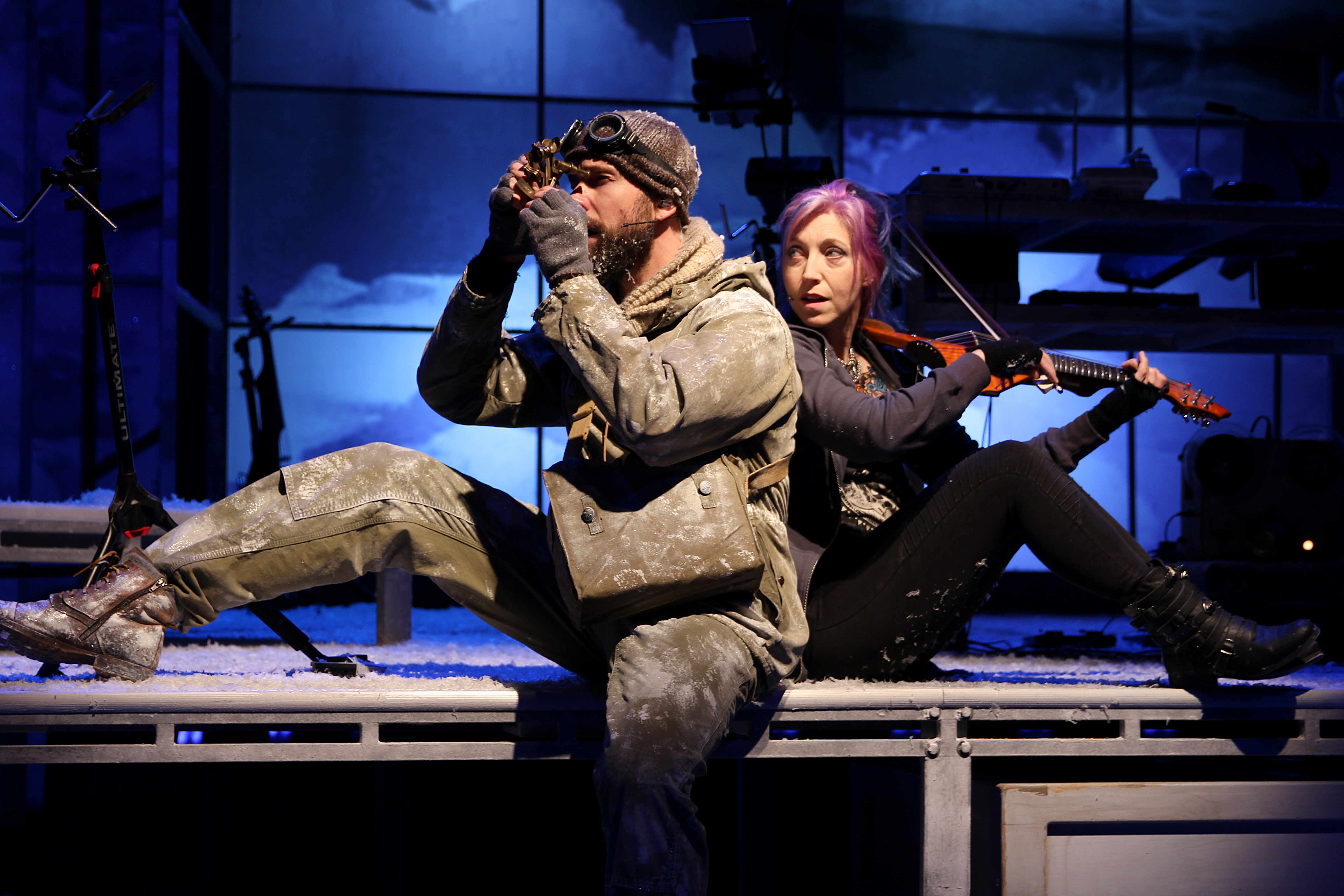Many words have been used to describe Moby-Dick—Lord knows Melville used enough himself in writing the classic novel—but “funny” isn’t usually among them.
That’s a shame. What’s often lost to the minutiae-shy reader is that between (and sometimes within) the shipping manifests and exhaustive descriptions of 19th-century whaling, there’s a hilarious tale about a buffoonish sailor navigating, narrating, and desperately trying to keep his head above the obsessively dug-in points of view of his fellow seamen.
But Moby-Dick was a flop that only entered the cultural zeitgeist with its critical revival after World War I. By that time and since, its archaic tone earned it a reputation as a Very Serious Old Work.
“There are actually some really funny parts in Moby-Dick,” says Chuck Armstrong, half of Seattle sketch-comedy duo Charles. “There’s a whole faux-French translation scene between second-mate Stubb and the captain of the Rosebud that is legitimately hilarious, even today.”
Armstrong and Charlie Stockman are the co-authors and performers of Moby Alpha, a comic sci-fi retelling of Herman Melville’s magnum opus now playing at the Ballard Underground. Like its source material, Moby Alpha follows the crew of the Pequod on Captain Ahab’s mad quest to kill the monster that took his leg. Unlike in Melville’s tale, the Pequod is a starship, the monster is an amorphous energy cloud, and Ahab is walking quite well with the assistance of a bionic leg.
The show was conceived when the Bellevue-raised Armstrong was at Stanford, based on riffing with a friend about the novel both were reading. “[We] had this conversation about other places the story could be set,” Armstrong says. “You know—the way that everyone unnecessarily reimagines Shakespeare plays, like in a mental institution or whatever. When we hit on space as a setting for Ahab’s quest for the white whale, we were both greatly amused. The idea stuck with me.”
A dozen years later, performing on a bare, pitch-black stage, Armstrong and Stockman play all Moby Alpha’s characters, distinguished by the differently colored LED lights on their space helmets. It’s a lighthearted, stripped-down take that, though hitting all the major plot points, is less concerned with Moby-Dick ’s story than with using it as a vessel for poking fun at various science-fiction cliches and referencing space-faring classics from Star Trek to Alien.
After all, Ishmael might be considered a kindred spirit to any casual geek or outside observer of sci-fi fandom, populated with the kind of people who obsess over the logistics of transporter travel or how such a device might, say, create an evil double while still adhering to the laws of physics.
Stockman says of Moby Alpha, “It is sort of a hybrid of a play and sketch-comedy show in that it follows a story arc, but each individual scene for the most part also works on a stand-alone level.”
Armstrong adds, “The main characters all kind of go through a kind of pop-culture sci-fi odyssey. For that reason, the show seems to resonate most with sci-fi fans.”
Moby Alpha
has the type of premise that would be right at home in one of Charles’ comedy sketches, where audiences might see Santa Claus get caught up in an argument about race relations, or a marketer desperately try to salvage a presentation after realizing Jaguar deals in cars, not jungle cats. Over the past four years the two have become known, in small Seattle theaters and on the sketch-festival circuit, for this highbrow brand of absurdity.
It’s writing-centric comedy, perhaps because neither Armstrong or Stockman expected to be a performer. Armstrong jokes that the LEDs in Moby Alpha make up for their lack of acting skills. He might not even have become a writer—he excelled in math and science as a child, and now works as a project manager in the tech industry—if his fourth-grade teacher hadn’t encouraged him to use humor in creative-writing assignments, he says. At Bellevue High School, he became a drama kid more likely to re-enact his favorite Monty Python sketch than a Shakespearean soliloquy.
Armstrong met Stockman, a Baltimore transplant, when the latter was editing the Stanford humor magazine, The Chaparral, where Armstrong was a staff writer. Armstrong majored in symbolic systems and Stockman, now a freelance web designer, majored in computer science, but they bonded over their shared comic sensibilities and work on “the Chappie.” They moved to San Francisco after college as roommates, and eventually relocated to Seattle.
“We were looking to launch a project together, and Seattle just seemed really appealing,” Armstrong says. “For one, we both had friends and family up here. But more importantly, we thought that Seattle’s a city that’s supportive of its artists.”
They began producing Seattle Untimely, a weekly web series inspired by John Keister’s “The John Report” from Almost Live!. This was 2007, and video series like Ask a Ninja looked like they’d become the Next Big Thing in podcasting—so Armstrong and Stockman decided it was important to produce a new episode every week.
“We bit off more than we could chew,” Stockman says today. “For two people basically doing all of the writing, directing, editing, and one-half to two-thirds of the acting, that meant almost all of those areas were going to suffer.”
After 49 episodes of Seattle Untimely, a friend of Armstrong’s from improv class invited him and Stockman to perform live. They gathered several old sketches, rewrote them to fit the format, and hoped for the best. One 30-minute show later, they decided they had found their new niche.
Charles has since opened for local troupes like the Pork Filled Players and performed at fringe festivals outside Seattle. A 2010 performance at the Toronto Fringe Fest took them “from famine to feast in terms of touring North America,” says Armstrong. “In a lot of ways, performing our own material started out as much a logistical decision as anything. But truthfully, we’ve learned a lot about writing from performing. We’ve learned the importance of keeping dialogue snappy and keeping motivations clear. And besides, as much as we love writing, there’s no denying that performing on a stage is one of the most fun things you can do.”
Still, Charles hasn’t left scripted videos entirely behind. The duo’s comedy short Less Rock, More Talk, an emotional debate among DJs on the preferred ratio of rock to talk, won the Seattle Comedy Film Challenge last year.
During the same period, Charles was workshopping Moby Alpha at the Eclectic Theater on First Hill. Early viewers like standup comic Emmett Montgomery of Laff Hole and Satori Group playwright Spike Friedman gave Armstrong and Stockman notes to help polish the show. “Artists love each other here,” says Stockman.
Moby Alpha has since been performed at the Edmonton and Winnipeg Fringe Festivals and at First Night Tacoma. Charles’ current production of Moby Alpha marks its Seattle premiere in final form; a three-week run in L.A. is in the works.
Might Moby Alpha be a calling card in Hollywood, to get Armstrong and Stockman sitcom writing work? Armstrong says Charles is keeping its comedy-platform options open. “The way television is changing,” he says, “there isn’t really a clear blueprint anymore.”
dnash@bellevuereporter.com
MOBY ALPHA Ballard Underground, 2220 N.W. Market St., 800-838-3006, brownpapertickets.com and charlescomedy.wordpress.com. $12–$15. 8 p.m. Fri.–Sat. Ends April 12.






